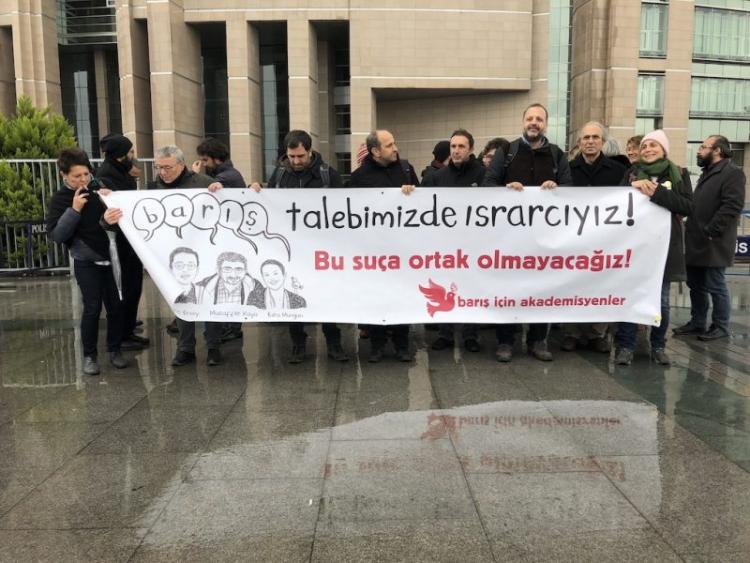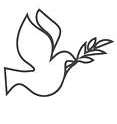
“They took my job, my career and my home from me,” said Serdar Değirmencioğlu, a former head of the psychology department at Istanbul’s Doğuş University. “That wasn’t enough, so they took my wife hostage. But they weren’t able to take my hope for peace and my power to fight back.”
Değirmencioğlu is one of hundreds of academics to have come under pressure from the state since 2016. Many have received prison sentences, or lost their jobs and their reputations – and all for signing a public statement calling for peace.
Their problems began in early 2016 when a group of university staff – known as Academics for Peace – published a statement titled We Will Not Be a Party to This Crime.
The document, which attracted 2,212 signatures, called for an end to the conflict between the government and the separatist Kurdistan Workers’ Party (PKK), gathering pace since the year before. PKK is considered a terrorist organisation by Turkey and some other countries as well, including the EU and US. Fighting had rendered some Kurdish-majority areas of Turkey uninhabitable and there was a growing civilian death toll.
The government responded first with threats – and then, when a state of emergency was declared after the failed coup of July 2016, with decrees to either sack or force into retirement 406 of the Academics for Peace. Staff removed from their posts also had their passports seized, with those who were abroad at the time unable to return home. A total of 822 were charged with spreading propaganda for a “terrorist organisation”; 204 received prison sentences, which were quashed in July 2019 when Turkey’s supreme court found they violated freedom of speech.
After the supreme court’s ruling, local courts began to dismiss outstanding cases against the academics, but nobody has had their passport returned or been given their job back.
Instead, those who were laid off have had to find other means of making a living.
Meral Camcı, who used to work in the English translation department at Istanbul New Century University, is continuing her work at the No-Campus Solidarity Academy, a students and teachers’ initiative to carry on holding lectures offsite.
“I was abroad when I heard my friends were getting arrested,” she said. “I decided to come home and – ironically – was arrested for being a flight risk. My 14 years of academic work was lost.”
Camcı is now an active campaigner to have people’s cases dismissed and jobs reinstated, and says the experience has made her and her colleagues stronger. “We have been united with colleagues that we may have never met otherwise,” she said. We discovered the joy of doing academic work together and new ways to teach society. Our return will be glorious and it will be revolutionary.”
Aslı Odman, who doesn’t want to name the university she works at, avoided being fired but was put on trial nonetheless. Like many other academics, her name and photo was published in newspapers and on social media, which made her a target of abuse.
“Going between campus and Çağlayan [the court house in central Istanbul] was a daily back-and-forth between a hollowed-out idea of academia and the real thing,” she said. “I realised that universities were in crisis when I heard about a friend being banned from giving a talk on receiving a state of emergency decree, and when we were told it wasn’t appropriate to join solidarity initiatives.”
Odman told Inside Turkey that many academics have chosen self-censorship, or a narrow focus on their own careers, as a result of the crackdown.
“The Academics for Peace case has become a cautionary tale, even though the cases were eventually dismissed,” she said.
Değirmencioğlu’s story illustrates what some of the Academics for Peace have gone through. After putting his name to the statement in early 2016, he said, he was removed from his post as head of department, students were encouraged to protest against him, he was prevented from taking part in conferences and his pay was docked without warning. He was abroad when the attempted coup took place.
“My lawyer advised me not to return to Turkey, because my passport could be seized. I started a new job in Egypt with only a few items of clothing and I had to live apart from my wife.”
When Değirmencioğlu’s wife tried to join him in Egypt, her passport was confiscated by airport officials.
“A police officer told her, ‘you’ll get your passport back when your husband returns.’ In the meantime, they charged me with ‘promoting a terrorist organisation’. The case was dismissed but [I have no future] in Turkey, so I live out here in exile,” he said.
By the end of 2017, cases were being heard daily at the Çağlayan courthouse in Istanbul.
“The indictment showed a clear hatred of Academics for Peace,” said İnayet Aksu, a lawyer who represented more than fifty of the accused. “Time and again, it used terms like ‘in effect’ or ‘in essence’ to argue that while their language was legal, they used it to de-legitimise the government and create room for the PKK.”
For Aksu, the cases embody Turkey’s political polarisation – including the way judges responded to the defendants in front of them.
“The class status of these professors, their intellectual attitudes, bothered these middling state officials. Their backpacks, their American accents, their glasses – all that became coded as the image of a Boğaziçi [an elite Istanbul university] graduate who went abroad to study and came back to challenge the government,” he said.
The government’s mindset was also reflected in the eventual dismissal of the cases, according to Aksu.
“The Kurdish resistance was subdued and the radical intellectual opposition dismissed. There is always a limit to repression in Turkey. The supreme court decision could be interpreted as Ankara reeling in a state institution heading in an extreme direction,” he said.
Government representatives and state officials declined requests to talk to Inside Turkey about the crackdown on Academics for Peace. But Sezgin Tanrıkulu, a lawmaker for the opposition Republican People’s Party (CHP) has closely observed the cases and held press conferences and events in support of the accused.
“Turkey’s brightest academics in the social sciences have been removed from universities,” he said. “They faced derogatory treatment, even in courtrooms. In one hearing I watched, the judge forbade an academic to sit down,” he said.
Tanrıkulu believes that Turkey’s judiciary has been encouraged by the government to behave like this.
“Erdoğan criticised [the academics] right after the petition was signed, before there was an indictment. He accused them of collaborating with terrorists, he humiliated and prejudged them,” Tanrıkulu said.
He also warned that the academics’ difficulties may not be over.
“The supreme court did rule that [the prosecutions] were a violation of human rights, but even in this very obvious case it was only a majority decision,” he said. “Many academics are still abroad, while those who are in Turkey have not been reinstated, and there are no signs from the government that they will be.”
Source: https://insideturkey.news/2020/03/06/the-war-against-academics-for-peace/
